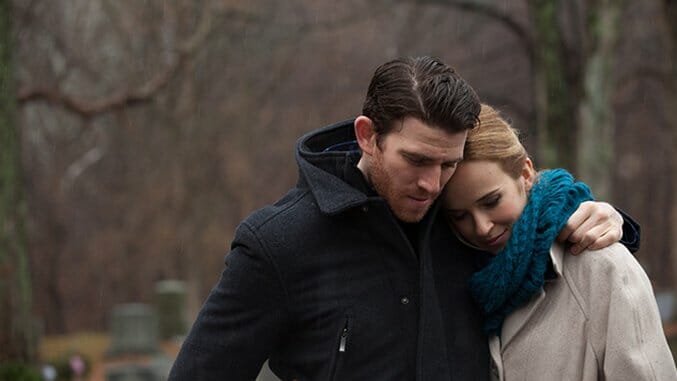A Year and Change

First-time writers and directors have a tendency to pour their every idea into their first stories—after all, a second chance is never guaranteed. Sometimes, the result is rich and complex; more often, like Stephen Suettinger’s debut, A Year and Change, it’s overstuffed and convoluted.
The movie spans a year (and change), at the heart of which is a sweet love story between the struggling, alcoholic Owen (played by Bryan Greenberg, late of How to Make it in America and One Tree Hill) and lonely, recent divorcée Vera (Claire van der Boom). After meeting Owen at a New Years Eve party in Maryland, Vera’s drawn to him—even though he drunkenly falls off the roof at that same party, shattering his arm—but she isn’t sure if she’s seeking love or just someone to whom to say goodnight each evening. Meanwhile, Owen’s fighting with his ex-wife, who might move to San Diego with his 11-year-old son. (Her argument is a sound one: he can’t even remember what day he’s supposed to pick the boy up for shoe shopping—and when he does, he’s usually drunk). Over the course of the aforementioned year, we watch Owen battle his demons to earn both his son’s respect and maybe a shot with Vera. Though it takes a few broken arms, he eventually puts down the bottle.
That story—in which Suettinger’s camera hugs Owen’s often hung-over face, while Greenberg milks all the soapy drama surrounding him for true emotion and van der Boom shines as a hurt, seeking woman who doesn’t resort to fights or binges to heal her pain but instead simply drives around town—is like a coffee table: simple, solid, effective and from the right angle actually quite beautiful.
Suettinger uses interstitial slow-motion shots of Maryland’s scenic landscape—from icicles dripping to water falling on daffodils to dandelion seed heads blowing into the wind—to trace Owen’s emotional journey through the year from quitting drinking to trying to be a good father, brother and neighbor. Throughout that year, his camera often rides passenger seat in Owen’s van, wherein Greenberg nails a cold, ever-present self-hatred without resulting to punched walls or emotional outbursts—and eventually the hope that shines in them.
-

-

-

-

-

-

-

-

-

-

-

-

-

-

-

-

-

-

-

-

-

-

-

-

-

-

-

-

-

-

-

-

-

-

-

-

-

-

-

-








































